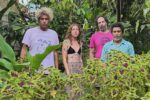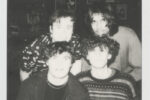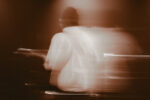Rio de Janeiro indie group embarks on two international tours as it returns to the stage with a new line-up and increasingly sharpens its unique sound, between post-punk, krautrock, Brazilian guitar and noise.
Formed during one of the most turbulent periods in recent Brazilian history (which has seen a coup d’état, political imprisonment, and the rise of the extreme right), Oruã was idealized by Lê Almeida, a cultural agitator in Rio’s independent scene, through his label Transfusão Noise Records. Based around the meeting point that became the Escritório, a space of collective creation which fosters an artistic community and a music scene that dialogues with the Brazilian underground from a unique place, Oruã emerged in improvisation sessions that mixed repetitive bass lines, electric phrases and indie guitar solos, doses of feedback and wall of noise to afrobeat and Brazilian references that ranged from Luiz Gonzaga’s primal Pernambuco sound to Brazilian guitar references. The name came about when Lê heard Lee Ranaldo during a concert in Brazil pronouncing something similar to what would become the band’s name. He jotted it down on a piece of paper in the dark, and the next day the Sonic Youth guitarist had baptized the group without knowing it.
At the same time that fascist extremism was coming out of the sewers to reach federal power, a new racial consciousness was emerging in the country. And it reached Lê, born in one of the poorest areas of Rio de Janeiro, Baixada Fluminense, who then began to realize that he was not only a key player in the Brazilian independent scene, but that his work echoed the resistance of ancestors who fought to be able to do what they wanted, even if they were forbidden. This awakening coincided with the moment in which the group went all in around Brazil and the world, crossing state borders in the US and countries in Europe, which inevitably affected the band’s sound.
Two international tours brought Oruã closer to the foreign market, a path they had already been following in other ways, such as when they were discovered by the leader of the classic American band Built to Spill, indie guitar hero Doug Martsch.
Doug became enchanted with the Rio de Janeiro group and invited two of its members to join his group’s new line-up: Lê played the drums, João Luiz took over as Built to Spill’s second guitar, and João Casaes, who would later join Oruã playing synths, played the bass. The Brazilians spent three years working with Built to Spill, playing with the band and opening shows as Oruã, as well as participating in the recording and production of Built to Spill’s most recent album, When the Wind Forgets Your Name, released in 2022 on SubPop. Before that, and during this period, the group had also been making their own material available on albums like Sem Bença / Sem Crença (2017), Romã(2019), Íngreme (2021), all released both in Brazil and abroad.
During this period its members also changed. Photographer Karin Santa Rosa (leader of the band Balbela) joined the group in 2021 playing drums. Karin’s entry changed the band’s line-up, which also includes João Casaes on synths, Bigú Medine on bass, and Lê on guitars and vocals. With this new formation, they went on to do more than 60 dates in four months of touring across the United States.
In the year 2023 the group is preparing to return to international stages. There are two tours with more than 40 dates already scheduled, through the US and Europe, where they will present the new version of the group to a public, who in previous years had begun to get to know a sound with essential elements of Brazilian music to vanguard of contemporary music and the language of experimental rock. Lê’s unmistakable voice mixes with the electric pulsing of his deconstructed guitar over a sophisticated and mesmerizing soundscape, taking both audience and band into a collective trance.
Photo – Isabela Georgetti
Text – Alexandre Matias



